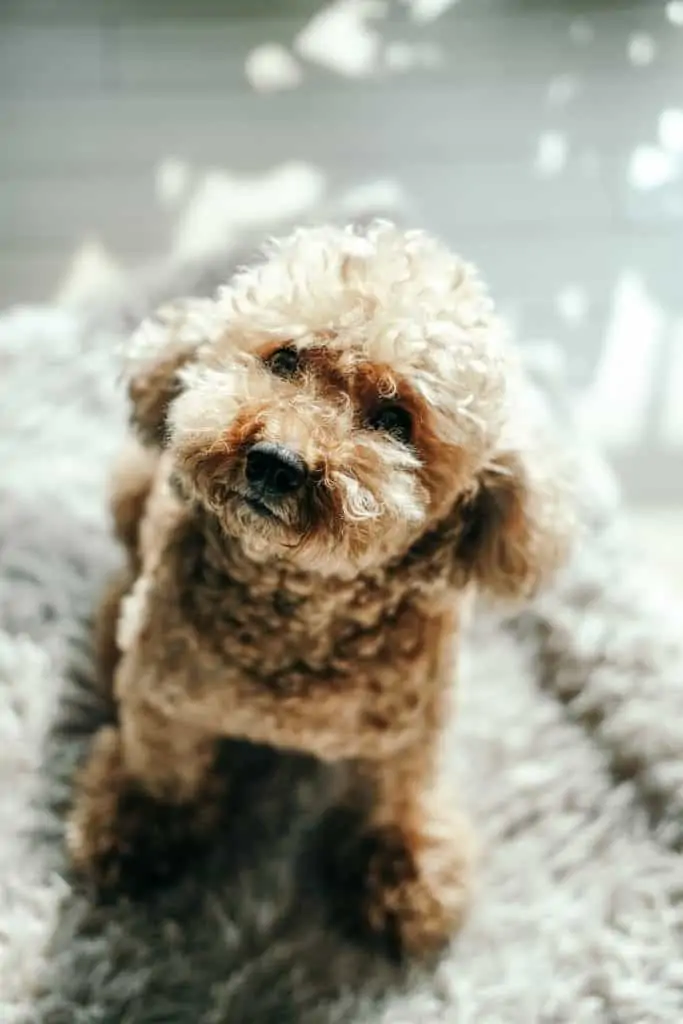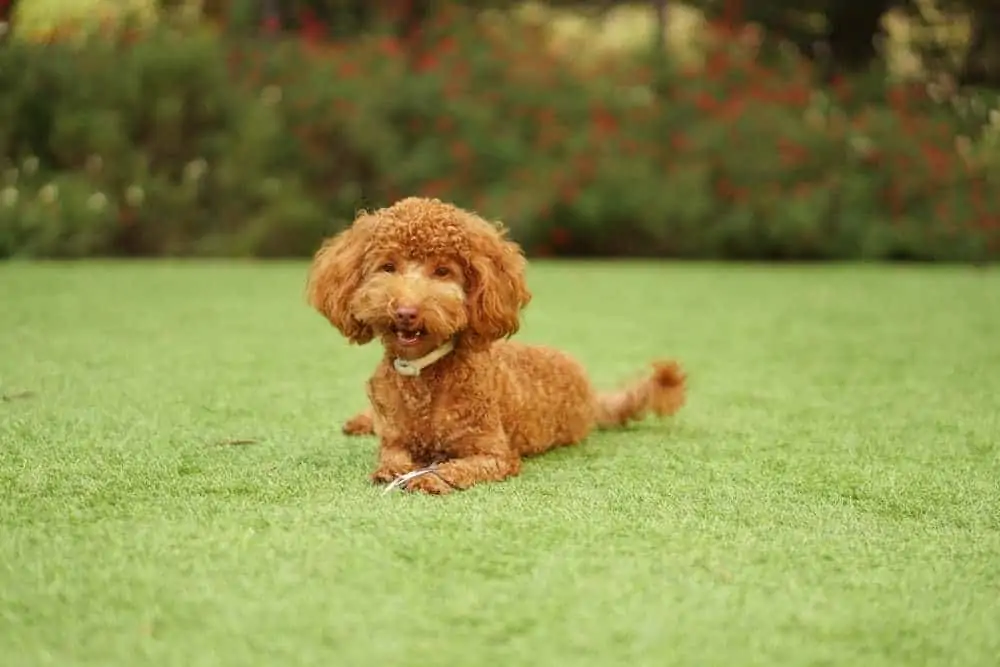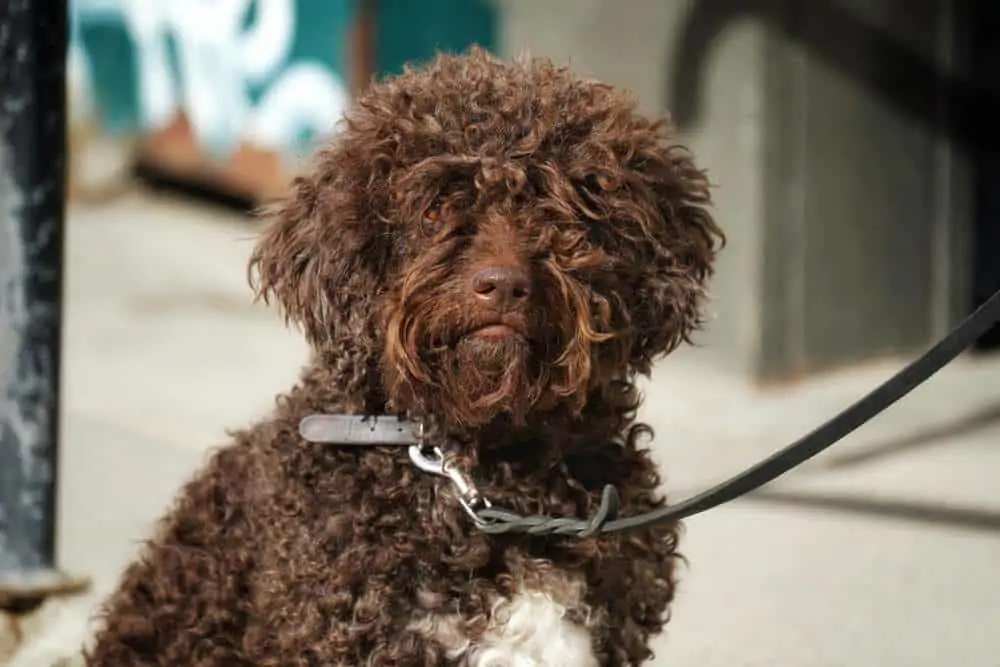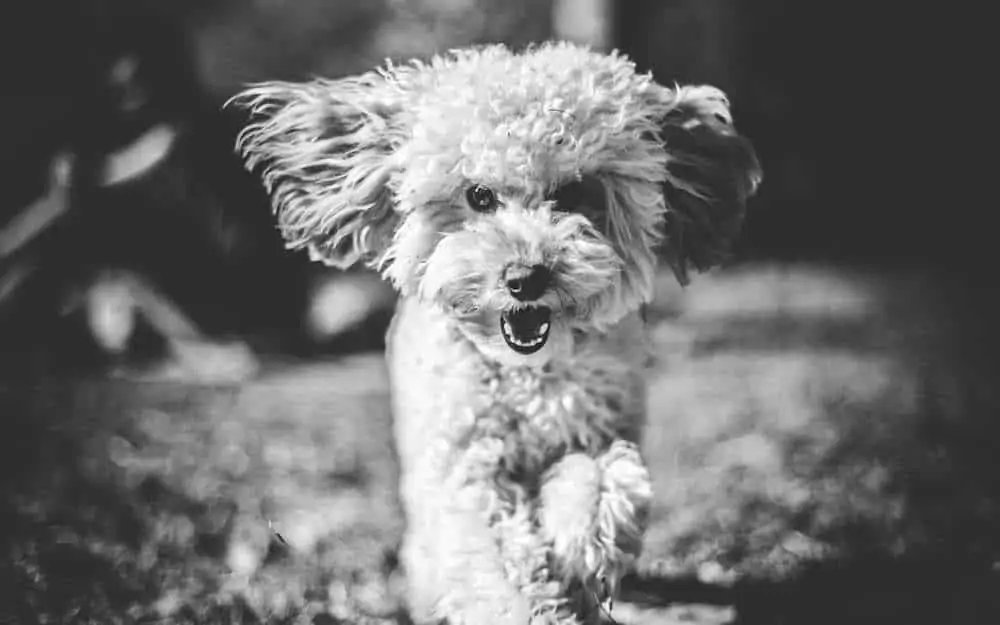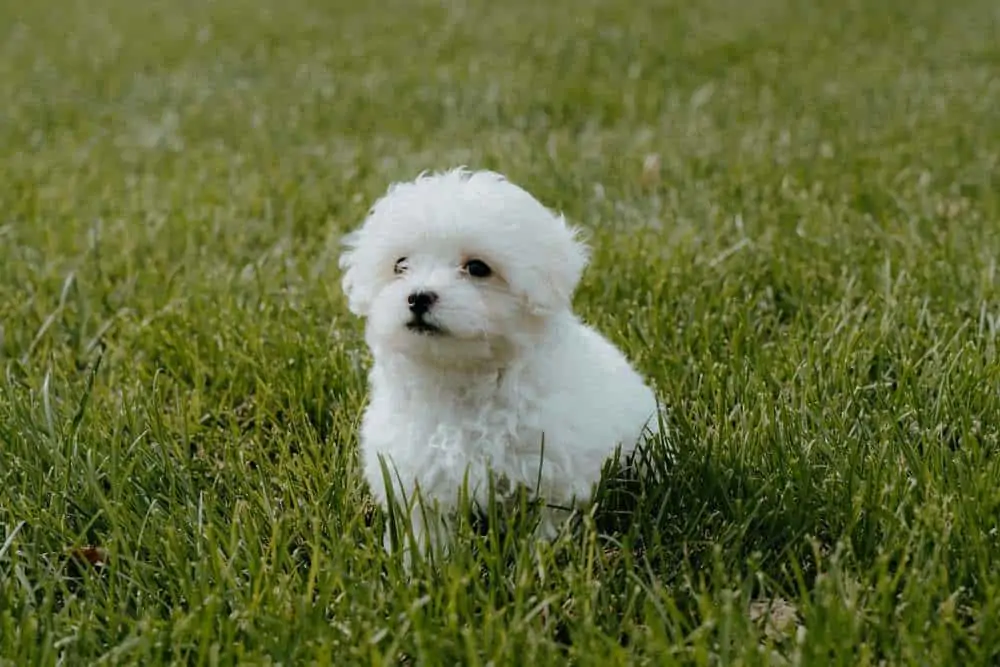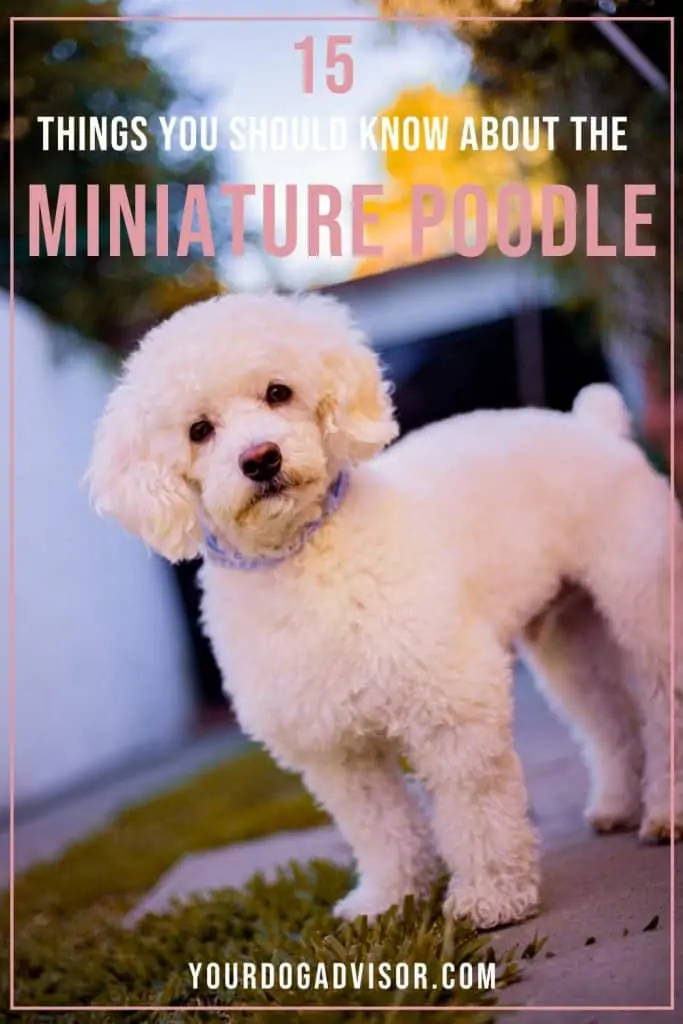Miniature Poodles are incredibly popular dogs for a number of reasons. These clever canines are hypoallergenic, compact yet athletic, and adaptable to different living environments.
Bred down from standard Poodles, the Mini Poodle is an excellent alternative to anyone who loves the Poodle temperament but doesn’t love the standard Poodle size. Of course, while there are a long list of lovely qualities to the Miniature Poodle, this adorable pup is not the perfect dog for everyone.
Are you curious if the Mini Poodle would be right for you? Then you’ve come to the right place. Keep reading because we are talking about 15 things you should know about this curly little cutie.
Contents
But First, Let’s Meet The Miniature Poodle
Miniature Poodles are one of three official size varieties of purebred Poodle.
Height: 10 to 15 Inches
Weight: 10 to 15 Pounds
Temperament: 10 to 18 Years Old
Lifespan: 14 to 18 Years
Health Issues: Addison’s Disease, Thyroid Problems, Bloat, Bladder Stones, Cataracts, Cushing’s Disease, Hip Dysplasia, Collapsed Trachea, Progressive Retinal Atrophy, Kidney Issues, Sebaceous Adenitis, Epilepsy, Legg-Calve-Perthes Disease
Clubs that Recognize The Miniature Poodle
The American Kennel Club (AKC)
Breed Overview:
As his name suggests, the Miniature Poodle is a bred down version of his standard sized canine counterpart. There is quite a difference between the average sized Poodle and the Miniature Poodle, with a standard Poodle standing up to 24 inches in height and weighing a whopping 40 to 70 pounds!
The Miniature Poodle is for the Poodle lovers who want all that Poodle personality packed in a smaller package. Miniature Poodles are also known for being highly intelligent, athletic, active and outgoing. They enjoy their family and other pets and get along well with children and strangers.
However, they can have a high prey drive and require lots of time, training and consistency from a good owner who understands working dogs.
Is the Miniature Poodle right for you? Let’s find out!
1. The Miniature Poodle Is One of Three Size Varieties Of Purebred Poodle
Other sizes include standard and toy.
Some dog breeds are called “miniature” when really they have been recently and perhaps not-so-responsibly bred down to make them more compact. This is not the case with the Miniature Poodle. In fact, the Miniature Poodle is one of three official size varieties accepted by most major breed clubs in the United States.
Other official size varieties of purebred Poodle include Toy and Standard.
In comparison, the Miniature Poodle is the mid-sized Poodle of the three. He is a few pounds heavier than the Toy and several pounds smaller than the Standard. (We should note here that, while popular, the teacup Poodle is not an official size variety of Poodle recognized by major breed clubs or associates.)
Originally, Poodles were bred working dogs (which we’ll get to further down), but their fanciful haircut made them incredibly popular to noblewomen in France. This attraction is what led to Poodles being bred down so they could be more suitable for companionship. So hats off to those fashion-forward ladies.
2. Though Sometimes Called “French Poodles” The Miniature Poodle Is Not Actually From France!
Poodles are originally from Germany, but made their way to France where they became very popular.
Poodles are often considered French dogs and sometimes even referred to as “French Poodles”. And while they were wildly popular in France in their early history, their true origin is actually Germany.
Originally, Poodles were bred as water retrieving dogs. Their dense, curly coats were ideal for protecting them from the frigid waters of Germany and their agile, athletic bodies helped them navigate through the water.
Better still, Poodles were found to be highly intelligent, eager to please and trainable. This is a trait that led them from water retrieving to many other types of work including street performing, circus performing, and even service dog work.
Eventually, Poodles caught the eye of French nobles, who fell in love with their flamboyant yet purposeful pompon (those cute puffs on their legs, tail and upper belly) hairdos.
As we mentioned above, this led to fanciers and breed enthusiasts eventually breeding the dog down so he could be better suited for companionship. It was then that the Poodle officially landed himself a spot as one of the world’s most popular, coveted and beautiful dogs in the canine kingdom.
3. Miniature Poodles Make Excellent Family Dogs
Poodles are friendly and eager to please, so they get along well with most everyone.
Though Poodles are often seen as prim and proper, the truth is they are incredibly hardy, playful and energetic. Miniature Poodles maintain all these endearing and attractive qualities, just in a smaller package.
These little dogs make excellent family companions as they get along well with strangers, children and other pets. Of course, their smaller size may mean that they can be more easily prone to injury if handled too roughly, so it’s important to monitor children around the dog to ensure everyone is getting along safely.
We also recommend that parents work with age appropriate children on how to recognize basic canine body language and how to recognize signs of stress or fear. Not only will this help you better communicate with your Miniature Poodle, it can also help reduce potential dog bites or behavioral issues down the road.
4. The Miniature Poodle Is Adaptable And Can Do Well In Apartments
Because of their smaller size, Mini Poodles can do well in apartments and smaller homes.
Standard Poodles are great dogs, but they are also great BIG dogs that are best suited for homes with lots of space. One of the alluring traits of the Miniature Poodle is that they do well in apartments and smaller spaces.
Their compact size also allows them to be better travel companions, especially to families that enjoy going on road trips!
However, Miniature Poodles can be prone to destructive behaviors, especially if all of their needs are not met. They may also be a bit vocal from time to time, so it’s a good idea to work with your Miniature Poodle early on to teach him and when not to bark. This is especially important if you live in an apartment or share walls with neighbors.
5. Though Small, Mini Poodles Need Plenty Of Exercise!
Miniature Poodles are very athletic and very smart, and without exercise and mental stimulation they can become depressed and stressed.
Although the Miniature Poodle is about a third of the size of his standard sized counterpart, that doesn’t mean he’s not going to need routine exercise.
Miniature Poodles are still Poodles, which means they are athletic, outgoing and energetic. Without routine exercise each and every day, your Mini Poodle could be prone to destructive behaviors like barking, marking, and chewing. Worse still, lack of exercise could lead to health and behavioral issues like stress, depression and aggression.
Most experts recommend that the Miniature Poodle be walked at least once a day for 30 minutes to an hour depending on his age and overall activity level. Your Miniature Poodle will also enjoy free playtime at a dog part for smaller dogs, or in a backyard if you have one.
Other ways to ensure your Mini Poodle is having his exercise needs met include taking him for hikes, going for swims, light jogs, and playing games of fetch or tug of war.
6. Miniature Poodles Are Hypoallergenic, But Grooming Can Still Be Extensive
The Miniature Poodle’s hair never stops growing, so without routine care it can quickly get out of control.
One of the reasons Poodles in general are so popular is due to their hypoallergenic coat. These dogs have a unique, curly coat that produces very little dander or loose hair. While all dogs shed to an extent, the Poodle sheds very little, which is excellent for anyone who suffers from allergies.
However, just because a Miniature Poodle is considered hypoallergenic does not mean he is easy to groom. The Miniature Poodle’s hair never stops growing, which means it can get out of control very quickly.
The tightly bound curls in your Miniature Poodles coat can also lead to mats, tangles and a buildup of debris.
Experts recommend you bathe your Miniature Poodle at least once every couple of weeks with a dog safe shampoo. He should also be brushed routinely, especially if his coat is longer. He may need to visit a professional groomer from time to time to get hair cuts, and he should have his ears routinely checked and cleaned to keep them free of debris, moisture or wax that could lead to ear infections.
Also be sure to trim your Mini Poodle’s nails often and to brush his teeth once a day with a dog-safe toothbrush and toothpaste to help prevent dental disease.
7. The Miniature Poodle Comes In A Good Variety Of Coat Colors
Apricot, red and blue Mini Poodles are the most rare.
Miniature Poodles come in a long list of colors and color combinations, but some colors are more rare than others.
Apricot is the rarest color of Poodle, followed closely by red and blue colors. But what makes these rare colors so rare? The genes responsible for these colors are recessive genes, which means both of a Poodle’s parent dogs need to carry that color gene in order to pass the rare color on to their puppies.
Even then, there is no guarantee that two apricot Poodle parents, for example, will have a litter with apricot colored puppies.
Other Poodle colors include black, cream, fawn, silver, silver beige, brown, white, sable, black and white, brown, grey, silver, blue and red.
If you want a specific Miniature Poodle coat color, and especially if you want a Miniature Poodle that is one of the more rare colors, you may need to fork over a little extra money and go through a breeder who specializes in these colored dogs.
8. The Miniature Poodle Might Be Difficult To Potty Train Thanks To His Smaller Size
Smaller dogs can be more difficult to train because their accidents are more difficult to find.
Smaller dogs like Miniature Poodles are notorious for being more difficult to house train. But why?
Well, it’s not because they are dumber than large breed dogs. In fact, experts and trainers have found that smaller dogs are just as capable as learning as large breed dogs, though potty training continues to be a difficult task.
The reason is likely due to a few factors. First, smaller dogs have smaller bladders, so they cannot hold their urine as long as their large breed friends. They therefore require a more routine potty schedule to ensure they are given enough opportunities to relieve themselves.
Another reason smaller dogs like the Miniature Poodle might be more difficult to house train is due to the size of their potties. Accidents can be difficult to find, and when a dog potties in a certain place he is likely to repeatedly go in this same place over and over again until the spot is effectively cleaned.
To combat this, we recommend investing in a puppy playpen that keeps your Miniature Poodle in a certain area until you are confident he has been house trained. This will allow you to better pinpoint any accidents and clean them efficiently in the meantime.
You might also consider investing in potty pads, which can help reduce accidents in the home by providing your smaller dog with a place to go if you are unable to frequently let him outside.
BV Potty Pads
[amazon box=”B07ZG5J985″ style=”light” title=”BV Potty Pads” template=”widget” ]
Paddy pads can be very helpful to a variety of owners, especially if you have a smaller dog that needs to use the bathroom more frequently. We like the BV Potty Pads for Miniature Poodles because they are leak proof pads that include six layers of protection. They also include a built-in attractant to help encourage dogs to use them, which makes them great for anyone in the process of potty training.
This product provides an order of 40 and another order of 240, depending on your needs. We recommend ordering small to test them out and ensure they work for you.
9. Miniature Poodles Are Social And Become Bonded With Their Family
The Mini Poodle is a family-oriented dog and is best suited for homes with owners who have flexible schedules.
If you’re looking into getting a Miniature Poodle, we recommend considering your schedule first. These tiny dogs are very devoted and people-oriented, and they can become stressed if they are left alone for too many hours during the day.
Although they are bred down versions of working dogs, the Miniature and Toy Poodle in particular are bred companions. This means they instinctively want to be with their family and can be susceptible to serious destructive behaviors if they become bored, stressed, or lonely.
To reduce separation anxiety in your Miniature Poodle, we recommend sticking to a schedule, ensuring your Mini Poodle is kept busy and active while you’re away, and ensuring your Mini Poodle is properly exercised before you leave.
10. Miniature Poodle Dogs Do Great With Other Dogs
When well socialized, the Mini Poodle will enjoy having other doggy playmates and siblings.
Are you looking for a social dog? You’ve found it in the Miniature Poodle. These dogs love to socialize and play with other dogs, and they can get along great with a number of other pets as well, so long as they have been properly socialized.
Of course, remember that Poodles were originally bred for water retrieving, which means it was their job to retrieve prey like ducks for their masters. This could mean that your Mini Poodle has an instinctually high prey drive, so don’t leave him with smaller animals like hamsters, rodents, and birds.
11. The Miniature Poodle Is A Very Clever Dog That Requires Lots of Mental Stimulation
Poodles in general have an extensive resume throughout history, which is likely due to their high level of intelligence.
As we did touch on briefly above, the Miniature Poodle is a super intelligent dog that can be prone to stress and anxiety if not kept mentally and physically stimulated.
Just as you need to routinely exercise your Miniature Poodle, you’ll also need to keep him mentally stimulated.
Mental stimulation tactics can range from daily, routine training games to providing your Miniature Poodle with puzzle toys to keep him busy. The Miniature Poodle will also enjoy partaking in agility courses you set up either inside or outside of your home, as well as games of fetch or hide and seek.
12. Mini Poodles Can Learn To Love Water When Introduced To It Correctly
Some Poodles love to swim, but it’s important to introduce your dog to the water gently and not force it.
As bred water dogs, it’s no surprise that a Poodle in general might love water. Of course, if you want your Mini Poodle to go swimming there are a few steps you should take to carefully and gently introduce him to water first.
Some Miniature Poodles are natural swimmers, while others will be weary of getting wet. Make sure you take time when introducing your Mini Poodle to the water and help him associate it with something positive. Never force him into the water when he is clearly frightened, as this can make his fear worse and lead to him hating the water in the future.
Of course, refrain from leaving your mini Poodle in bodies of water unsupervised and always try to ensure he is wearing a doggy life vest or floatation device in case of any accidents.
Mklhgty Dog Life Jacket
[amazon box=”B08Z41ZG6S” style=”light” title=”Mklhgty Dog Life Jacket” template=”widget” ]
Even if your dog is a top notch swimmer, most experts agree that it’s safest to use a canine life jacket when taking your dog out for a dip in deeper waters. We like the above dog life jacket because it comes in a variety of sizes so you can ensure you get the best fit.
It is also adjustable and even available in three different colors. Best of all, it includes reflector strips and a rescue handle to ensure you can easily find and grab onto your dog if you need to.
The life jacket is designed to fit comfortably on smaller sized dogs like the Miniature Poodle, and provides buoyancy to keep their heads above water while still allowing them to swim naturally.
13. You Have Lots Of Options When It Comes To Your Miniature Poodle’s Hairdo
Though the standard Poodle cut is most popular, there are plenty of other hairdos available for this adorable dog.
Remember when we discussed the importance of grooming your Miniature Poodle above? While grooming may not sound like the most fun part of being a pet parent, it is important. Plus, it can even help build a stronger, more trusting bond between you and your dog.
And when it comes to the Miniature Poodle, grooming is almost an art. In fact, there are several options you can choose from when it comes to your Miniature Poodle’s haircut. Whether you want to stick with a puppy cut, the traditional poodle cut, or anything in between, your Mini Poodle’s look can be almost as unique as you want it to be!
Just be sure to find reputable sources when looking for groomers and go to someone with a history and background on cutting Poodles. Remember, your Poodle’s hair is an important part of helping protect him from the elements, so if you do shave certain parts of your Poodle’s body, be sure to offer him alternative methods of protection from cold, heat and sun.
Emmy’s Best Dog Skin Protector
[amazon box=”B07SB22JNX” style=”light” title=”Emmy’s Best Dog Skin Protector” template=”widget” ]
Some Miniature Poodle haircuts require shaving off specific areas around the body, which can leave your dog susceptible to sunburn. This is especially true if you have a white or lighter colored Miniature Poodle.
To protect your dog’s skin, we recommend investing in a skin protector or canine sunscreen like Emmy’s Best Dog Skin Protector above. This dog sunscreen not only helps prevent sunburns but also helps soothe the skin. It can be applied all over your dog’s body, is a non-greasy and safe formula free of Zinc Oxide, and can even be used on your dog’s nose and paws.
14. Miniature Poodles Are More Susceptible To Suffering From Kidney and Bladder Issues Than Some Other Breeds
Though long lived, Poodles can be prone to some serious health issues you should know about.
Like all dogs, Miniature Poodles can be prone to suffering from a number of genetic health issues. That said, Poodles in general are some of the longest-lived dogs in the canine kingdom.
On average, miniature Poodles have a lifespan of between 10 to 18 years. However, they can be prone to some unique health issues including bladder problems and kidney disease.
Other health issues miniature Poodles can be predisposed to include:
- Addison’s Disease
- Thyroid Problems
- Bloat, Bladder Stones
- Cataracts
- Cushing’s Disease
- Hip Dysplasia
- Collapsed Trachea
- Progressive Retinal Atrophy
- Kidney Issues
- Sebaceous Adenitis
- Epilepsy
- Legg-Calve-Perthes Disease
You can help combat future health issues by ensuring your Miniature Poodle maintains a healthy diet for small breed dogs. Be sure his dog food is free of any additives, byproducts, fillers, corn, wheat, soy or gluten.
Instead, invest in a dog food that is high in real meat protein, contains a good source of fatty acids, vitamins, minerals, carbohydrates and water.
It’s also a good idea to have your Mini Poodle health screened at an early age, keep up with routine vet visits, and ensure you stick to a proper grooming, exercise, and mental stimulation routine throughout your Mini Poodle’s lifetime.
15. A Miniature Poodle Puppy Can Cost Between $1,000 to $1,500
Miniature Poodles tend to cost between $1,000 and $1,500 when going through a breeder.
The Miniature Poodle is a very popular purebred dog. In fact, he sits at number 7 out of 197 on the American Kennel Club’s list of most coveted canines. That means that the price for this little cutie may be more than some other purebred dogs when going through a reputable breeder.
On average, a Miniature Poodle through a republet breeder can cost between $1,000 and $1,500. This price can vary depending on your region, the breeder you go through, and the quality of your Poodle’s parent dogs. If your Poodle’s parents are show quality, the price of your Miniature Poodle puppy will likely be more.
It’s very important not to try and cut corners when looking for a Miniature Poodle through a breeder, as you could easily wind up buying from an irresponsible source like a backyard breeder, puppy mill, or uncertified online seller.
Instead, stick with breeders you trust who can provide you with references and paperwork proving your puppy’s pedigree as well as proof of health screenings.
If you would prefer to rescue your Miniature Poodle, you’re in luck! There are plenty of breed-specific organizations throughout the United States that can help guide you to a quality shelter in your area.
When rescuing a dog, there are still some fees. The average price of adopting a Mini Poodle ranges from $250 to $500. Along with the potential to save money and offer a dog in need a loving forever home, rescuing also comes with the added benefit of rescuing adult dogs that have already been spayed or neutered, and may have even undergone some training.
Regardless of where you choose to get your Miniature Poodle, the good news is that you’re already on the right track.
Doing your homework and making sure that the Mini Poodle is right for you and your family is the first step to ensuring you and your Miniature Poodle have a long and happy life together.
Best of luck and thanks for reading!


Jen Jones is a professional dog trainer and behavior specialist with more than 25 years of experience. As the founder of ‘Your Dog Advisor’ and the ‘Canine Connection’ rehabilitation center, she applies a holistic, empathetic approach, aiming to address root causes rather than merely treating symptoms.
Well known for her intuitive and compassionate approach, Jen adopts scientifically-proven, reward-based methods, encouraging positive reinforcement over punishment. Jen specializes in obedience training, behavior modification, and puppy socialization. Her innovative methods, particularly in addressing anxiety and aggression issues, have been widely recognized. Jen has worked with many of the world’s leading dog behaviorists and in her free time volunteers with local animal shelters and rescue groups.

